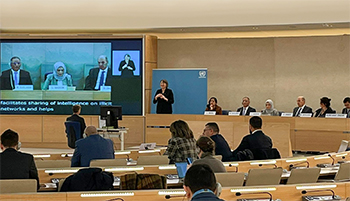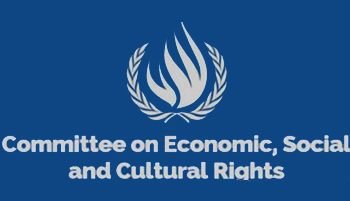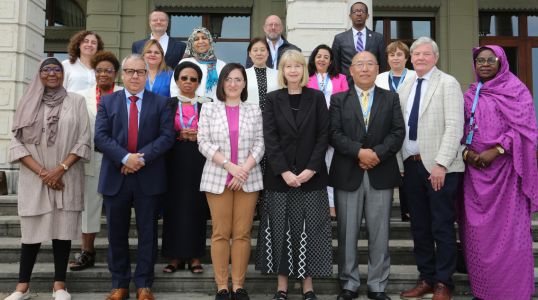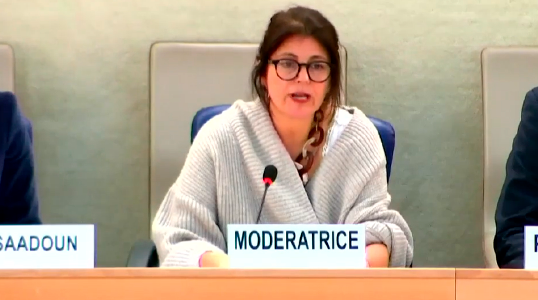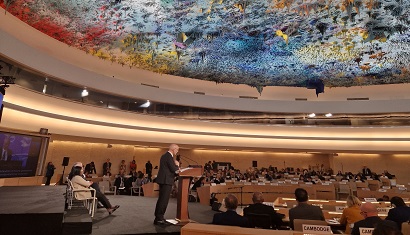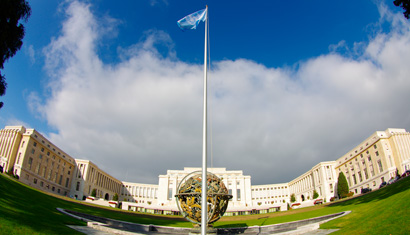On 13th February, our Executive Director, Magdalena Sepúlveda Carmona, participated in a pivotal expert meeting organised by the Office of the United Nations High Commissioner for Human Rights. This critical meeting concentrated on the intricate obstacles that prevent the return of illicitly obtained funds to their rightful countries.
The meeting, convened in response to the Human Rights Council's resolution 52/21, emphasised the critical nature of addressing the non-repatriation of illicit funds and its negative implications on human rights globally, highlighting the need for comprehensive strategies to address this critical issue.
Participants, including states, advisory committees, and other stakeholders, discussed challenges and best practices related to repatriating illicit funds. The goal was to formulate actionable recommendations that enhance the global framework for asset recovery.
This expert meeting built on a series of reports and resolutions, including the General Assembly's resolution on promoting international cooperation to combat illicit financial flows and the Advisory Committee's studies on utilising non-repatriated illicit funds. These documents laid a solid foundation for the discussions and highlighted the urgent need for cohesive action against the barriers to funds repatriation.
More information can be accessed here.
Aligned with our advocacy efforts towards U.N. mandate holders to continuously strengthen public education and human rights standards, as well as address crucial issues affecting the right to education, along with Campaña Latinoamericana por el Derecho a la Educación (CLADE) and the Right to Education Initiative (RTE) we submitted a joint contribution to the study on the solutions to promote digital education for young people and to ensure their protection from online threats to be presented at the 57th session of the Human Rights Council in September 2024 by the Office of the High Commissioner for Human Rights (OHCHR).
The submission focuses on question 4 of the call: “What are the main gaps and challenges to young people’s protection from online threats in law, policy, and practice in your country and the impacts on young people’s human rights?”
We brought to the attention of the High Commissioner the following risks which directly affect the human rights of young people: privacy and data usage; online violence; and, hazards to health. Additionally, we highlighted a substantial systemic issue, the growing trend toward the privatisation of and in education.
For more information, consult the submission below.
GI-ESCR along with partners Oxfam-Mexico, Fundar-Center for Analysis and Research, and Friedrich Ebert Foundation-Mexico, submitted a list of issues to the UN Committee on Economic, Social and Cultural Rights (CESCR) regarding Mexico's upcoming review.
The submission focuses on the need for progressive tax reform in Mexico to realise economic, social, cultural, and environmental rights. It provides background on using fiscal policy to fulfill human rights obligations, highlights a Constitutional amendment initiative under consideration in Mexico's Congress, and proposes specific questions for CESCR to ask the Mexican government.
Key points from the submission:
· Mexico has one of the lowest tax collection rates globally but high inequality, with the top 10% controlling 63% of income.
· The tax system currently does not reduce inequality and protects the interests of big corporation and rich individuals.
· A Constitutional amendment is proposed to incorporate fiscal progressivity, allowing higher taxes on extreme wealth to fund rights realisation.
· The submission suggests CESCR ask Mexico about the status of this amendment, plans for comprehensive progressive tax reform, and ensuring public participation.
GI-ESCR and partners calls on the Mexican government to undertake progressive tax reform as a tool for reducing inequality and mobilising maximum available resources for human rights. We look forward to CESCR's review and recommendations to advance economic and social justice in Mexico.
The Global Initiative for Economic, Social and Cultural Rights (GI-ESCR) submitted a written contribution to inform the draft General Comment No. 26 on children’s rights and the environment with a special focus on climate change of the Committee on the Rights of the Child (CRC).
Following the invitation by the CRC to stakeholders to present inputs and comments on the draft General Comment, GI-ESCR presented a submission aiming to strengthen the draft’s considerations on just transitions and highlight critical issues that are central to children’s rights approaches to environmental justice. In particular, the inputs to the draft covered the following two issues:
First, the inputs presented relate to the risks and opportunities that the transition to renewable energy represents for the realisation of children’s rights. GI-ESCR highlighted that renewable energy has the potential to undermine or hinder children’s rights. In particular, GI-ESCR stressed that large-scale renewable energy projects have already replicated harmful extractive practices that amount to human rights abuses. Thus, to prevent the shift to renewable energy from replicating existing inequalities or creating new human rights abuses, those leading the transformation should follow human rights principles. In that regard, GI-ESCR emphasised that the standards to guide the development of a global energy system are to be found in the Convention on the Rights of the Child.
Second, the submission puts to the consideration of the Committee the importance of combating the commercialisation of public services on education and health to respect, protect and realise children’s rights. In this regard, GI-ESCR underscored that market-based public services are unsustainable, especially in times of crisis. For instance, GI-ESCR gave the example of the COVID-19 pandemic, when the widespread closure of private schools and private education companies undergoing bailout plans left millions of children without a school, deepening structural inequalities in access to education. Consequently, given the impact of crises to come due to climate change, GI-ESCR underlined that to respect, protect and realise children’s economic, social, and cultural rights amidst climate change and broader planetary emergencies, States must ensure properly funded and quality public services.
The submission aimed to contribute to a landmark tool that further clarifies international human rights obligations derived from the Convention on the
Rights of the Child and provide guidance for States on how to address the severe impacts of the climate crisis on children’s rights.
You may read the submission here:
On 18th January, our Executive Director, Magdalena Sepúlveda, participated in the Sixth Intersessional Meeting of the Human Rights Council on Human Rights and the 2030 Agenda. The meeting topic was ‘Integrating Human Rights into the International Financial Architecture Reforms: A Cornerstone for Realizing the 2030 Agenda for Sustainable Development and a Human Rights Economy’. The meeting convened high-level representatives from the UN missions in Geneva. It counted with the participation of the UN High Commissioner for Human Rights, Mr Volker Türk, the President of the UN Economic and Social Council (ECOSOC) H.E. Ms Paula Narvaez and the Special Advisor to the Minister of Finance, Brazil, Ms Fernanda Cimbra Santiago.
Magdalena participated and moderated the first session, ‘Applying a Human Rights Lens to the Reform of IFIs to Eradicate Poverty and Advance Human Rights and the Sustainable Development Agenda.’
This panel focused on how international financial institutions’ (IFI) policies, operations, analyses and metrics could be aligned with the human rights obligations of Member States and the 2030 Agenda for Sustainable Development. Speakers at this panel included:
- Prof. Jayati Ghosh, Professor of Economics at the University of Massachusetts Amherst, Member of the UN High-Level Advisory Board for Economic and Social Affairs
- Prof. Avinash Persaud, Special Advisor on Climate Change at the Inter-American Development Bank, former Special Envoy to the Prime Minister of Barbados on Investment and Financial Services
- Mr Robert Powell, Special Representative to the UN, International Monetary Fund
- Ms Sarah Saadoun, Senior Researcher and Advocate, Poverty and Inequality, Human Rights Watch
You can watch the 1st Meeting of the Sixth Intersessional Meeting of the Human Rights Council on Human Rights and the 2030 Agenda here.
In culmination of a year-long campaign for the 75th Anniversary of the Universal Declaration of Human Rights, OHCHR organised a High-Level Event in Geneva on December 11-12. GI-ESCR actively participated throughout the campaign, with its Executive Director, Magdalena Sepulveda, serving as a panellist alongside Heads of State, UN agencies, and artists in one of the four Roundtables discussing the future of human rights. GI-ESCR was the only non-governmental organisation represented at the crucial panel for our areas of work
On December 11, two Pledging Sessions featured States announcing commitments to advance human rights, while Voices in Defense of Human Rights segments allowed participants to share testimonies on the impact of the Universal Declaration.
On December 12, the Leaders' Segment included a conversation among Heads of State moderated by the High Commissioner, followed by four round tables addressing pressing human rights issues. GI-ESCR's Executive Director participated in the high-level round table on "The Future of Human Rights: Development and the Economy."
The panel addressed two critical questions: concrete human rights-rooted measures to reduce income and wealth inequalities, and how human rights can help States reclaim fiscal space in an environment of debt distress, ensuring greater investment in essential services.
The panel, moderated by Melissa Fleming, featured speakers such as the Prime Minister of Namibia, H.E. Ms. Saara Kuugongelwa-Amadhila, and representatives from Chile, Mongolia, UNDP, UNCTAD, and the Francophonie organization. Respondents included officials from Cuba, Zimbabwe, Lesotho, the International Monetary Fund, Burkina Faso, Finland, Italy, Mexico, legal advisors, and representatives from Azerbaijan and Algeria.
The Geneva High-Level Event offered accessibility features such as international sign language interpretation, real-time captioning, and simultaneous interpretation in the six UN official languages. It was also connected online to regional hubs in Bangkok, Nairobi, and Panama for related discussions and events.
Aligned with our advocacy efforts towards U.N. mandate holders to continuously strengthen public services and human rights standards, the Global Initiative for Economic, Social and Cultural Rights (GI-ESCR) submitted two oral statements during the HRC 54.
The oral statement prepared for the interactive dialogue with the Expert Mechanism on the Rights of Indigenous Peoples welcomed the EMRIP’s report “Efforts to implement the United Nations Declaration on the Rights of Indigenous Peoples: Establishing Effective Monitoring Mechanisms at the National and regional levels for the implementation of the Declaration.” It thanked the Expert Mechanism for their efforts in promoting, protecting, and fulfilling the rights of Indigenous Peoples. It highlighted the importance of EMRIP’s proposal of collecting and disseminating disaggregated data and its relevance to monitoring Indigenous Peoples' access to quality public services, such as education and healthcare. It also stressed the importance of establishing pertinent indicators, benchmarks, and evaluation methods to assess the degree to which Indigenous Peoples enjoy their economic, social, and cultural rights.
Watch the oral statement here:
Read the oral statement here:
The oral statement prepared for the interactive dialogue with the Special Rapporteur on the Rights of Indigenous Peoples, José Francisco Calí Tzay, welcomed his report on Green Financing – a just transition to protect the rights of Indigenous Peoples. It called to the Special Rapporteur’s attention one aspect often underestimated: the need to direct green climate finance to expanding public services, which are vital to addressing the climate emergency. It highlighted that a strong system of public services is one of the most effective means to immediately respond to climate-related disasters and create societies that provide well-being conditions within planetary boundaries.
Watch the oral statement here :
Read the oral statement here:
The elections for the UN Committee on Economic, Social and Cultural Rights (CESCR) have been announced for 9 April 2024, and the deadline for nominations of candidates is 23 November 2023.
As you know, the CESCR is the monitoring body for the International Covenant on Economic, Social and Cultural Rights (ICESCR), which promotes and protects international economic, social and cultural rights. The CESCR comprises 18 independent experts elected by States Parties to the ICESCR.
Half of the current members of the CESCR will finish their terms as Committee members on 31 December 2024. Therefore, there are 9 seats up for election. The seats are distributed between the geographical regions. Accordingly, at this election, there are 2 Africa seats, 2 Asia seats, 2 Eastern Europe seats, 2 Western Europe & other seats, and 1 Latin American & Caribbean seat.
Whilst nominations can only be made by States, civil society actors can make suggestions to their Government about suitable candidates. The CESCR is only as strong as its membership, so it is crucial to ensure that ideal candidates are nominated and elected. Civil society organisations should play a key role in reinforcing the effectiveness of the CESCR by proposing the most qualified and suitable independent experts for the protection and promotion of ESCR. Therefore, we encourage them to identify strong, independent candidates for nominations to the CESCR.
Currently, there are just 6 women on the CESCR; hence, we strongly suggest that civil society actors identify qualified female candidates. Further, the independence of members is sometimes missing, which has serious adverse implications for the work of the CESCR. Therefore, we encourage the civil society movement to advocate for nominating candidates independent of their State.
For further details, please refer to this link:
https://www.ohchr.org/en/events/events/2024/committee-economic-social-and-cultural-rights-2024-elections.
74th Pre-Sessional Working Group of the Committee on Economic, Social and Cultural Rights
The latest update on economic, social and cultural rights is now available.
Between 4 and 7 March 2024 (dates to be confirmed), the Committee on Economic, Social and Cultural Rights will hold its 74th Pre-Sessional Working Group. In this meeting, the Committee will adopt the Lists of Issues for the upcoming reviews of the periodic reports of Angola, Georgia (annex), Mexico (16 annexes), Namibia, Pakistan and Sierra Leone.
Civil society organisations and national human rights institutions can participate in selecting issues through written submissions or informal briefings. Written submissions and requests for informal briefings concerning the Lists of Issues have to be made through the Committee’s online submission system on a date that will be defined later during the year by the Committee (information will be available on the Committee’s website.
For more information on participation, please contact the secretariat at

